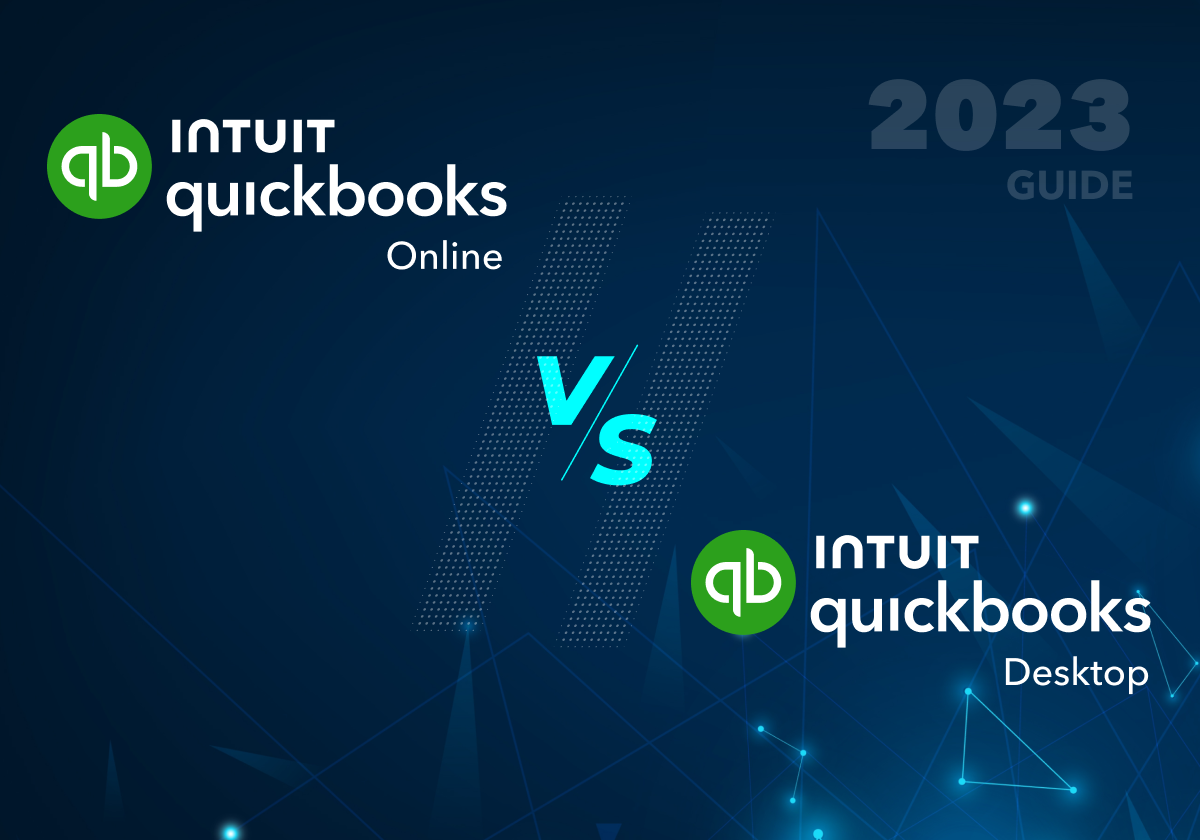Choosing the right version of QuickBooks for your business can be a crucial decision, as it impacts your financial management and accounting processes. Intuit QuickBooks is a top accounting software offering two versions: QuickBooks Online and QuickBooks Desktop. Both have unique plans, merits and comprehensive features that tick most boxes.
In this guide, we’ll help you understand what each version is capable of, what type of business is best for each version of QuickBooks, and the main differences between these products.
QuickBooks Online
Introduced in 2004, QuickBooks Online is a cloud-based accounting software utilized by more than two million users. With its robust accounting functionalities, impressive feature set, integration with over 650 other applications, and comprehensive mobile apps, it’s no surprise that it ranks among our top recommendations for accounting solutions.
QuickBooks Online offers a vast array of features and automated processes. The software encompasses a wide range of accounting functions, including invoicing, expense tracking, managing accounts payable, handling contacts, project management, inventory management, budgeting, and more. While there might be occasional challenges with navigating the interface, QuickBooks Online is, on the whole, remarkably user-friendly.
Pricing: QuickBooks Online offers a pricing range from $30 to $200 per month, with each plan differing in terms of its feature set and the allowable number of users. You can have up to 25 full-featured users in total, and there’s no limit to the number of time-tracking-only users you can add.
QuickBooks Desktop
QuickBooks Desktop launched in 1992 is a locally installed software, rich in features, including contact and lead management, expense tracking, project management, accounts payable, invoicing, and various other functionalities. QuickBooks has three subscription plans: Pro, Premier, and Enterprise. It allows access for up to 40 users and provides ample storage space.
Pricing: QuickBooks Desktop offers a pricing range from $549 to $1340 per year with each plan differing in terms of features and user access.
QuickBooks Online vs. QuickBooks Desktop: An overview
QuickBooks Online and QuickBooks Desktop are both robust accounting software options for small businesses, offering complete double-entry accounting and automated handling of closing entries. If you’re considering switching to QuickBooks Online or transitioning from QuickBooks Desktop, it’s essential to compare these two applications.
One noticeable distinction is in the user interface: QuickBooks Online features a more streamlined design, while QuickBooks Desktop relies on a flow-chart-based interface. Both provide access to a wide range of features and functions, and the choice between them depends on your specific needs and preferences.
While QuickBooks Online is often praised for its anytime/anywhere accessibility, it’s worth noting that QuickBooks Desktop can be hosted on a virtual server, offering the reliability of a desktop application with cloud access. Besides cloud access, there are other differences between these two applications that we will explore further.
Let’s quickly compare both versions of QuickBooks:
| Feature | QuickBooks Online | QuickBooks Desktop Plus |
| Accessibility and Mobility | Work from anywhere on any device | Work on a dedicated machine only |
| Subscriptions Available | Self-employed– $15/month Easy Start: $30/month Essentials: $60/month Plus: $90/month Advance: $200/month |
Pro: $41/month (1 user) Premier: $64/ month (2 users) Enterprise: $1830/ Year (1-10 users) |
| Cloud Access Included | Access your books from any device (PC, Mac, mobile, tablet) and collaborate with your team across locations without any software to install. | Locally installed with optional cloud hosting at a cost. |
| Live Collaboration | Collaborate across multiple users, devices, and locations | In-person on one device only |
| Number of Users Included (The number of licenses vary depending on your subscription) | 5 users are included with QuickBooks Online Plus and 25 with QuickBooks Online Advanced. Additional fees apply for each Desktop user. | Up to 40 users (Additional fees per user) |
| 3rd Party App Integration | QuickBooks Online lets you easily integrate with popular cloud software like Shopify, PayPal, etc. up to 750+ to build your ecosystem. | Streamlined interface (Limited integration up to 260+) |
| QuickBooks Live* | For an additional fee, you can hire a QuickBooks-certified bookkeeper to do your books for you. | Additional fees apply (Not supported for Desktop) |
| Discontinuation of Versions | Unlikely to be discontinued | Supports 3 annual versions at a time and Previous versions are discontinued (2021, 2022, 2023) |
| Common Features | Strong accounting features, Hundreds of integrations, Invoicing, Expense Tracking, Contact Management, Inventory, Time tracking, Project management, Budgeting, Reporting, Tax support, Payroll add-ons, Mobile apps, Mac compatibility | |
| Exclusive Features | – Fully cloud-based format, Optional live bookkeeping support, High-quality invoice designs, Ability to auto-schedule invoices, Invoicing in multiple languages, nearly 500 more integrations than QuickBooks Desktop | Sales orders, 50 more reports than QuickBooks Online, Optional industry-specific features and reporting, Features to manage Leads |
Related Article: Xero vs Sage Intacct vs QuickBooks Online
Pros of QuickBooks Online:
- Utilizes cloud technology for remote accessibility with an internet connection
- No need for on-premises servers, reducing IT staff requirements
- QuickBooks Accountant mobile app offers additional features
- QuickBooks Online supports up to 25 users without additional cost, while Desktop charges per user
- Allows easy data restoration in QuickBooks Online, unlike QuickBooks Desktop
- QuickBooks Online includes free customer support, unlike some versions of Desktop
- Provides automatic backups and feature updates without extra charges in QuickBooks Online
- Offers integration with third-party apps for streamlined workflows and AP automation
Pros of QuickBooks Desktop:
- QuickBooks Desktop Enterprise and Premier Plus editions offer industry-specific versions that are not available in the online version.
- QuickBooks Desktop has an edge with advanced features like inventory management and job costing, making it a robust choice for businesses with intricate requirements.
- Reports are more extensive in QuickBooks Desktop
- QuickBooks Desktop offers greater customization, especially in the Enterprise version.
- QuickBooks Online Advanced is limited to a maximum of 25 users, while Desktop Enterprise supports up to 40 users
Tax1099 Integration with QuickBooks Desktop & QuickBooks Online
Whether you opt for QuickBooks Desktop or QuickBooks Online, Tax1099 seamlessly integrates with both accounting software systems. With a single click, effortlessly sync your 1099 vendors from QuickBooks Desktop and QuickBooks Online to Tax1099, streamlining your tax preparation process.
Tax1099 provides a comprehensive suite of features including year-round eFiling, prior year eFiling, corrected forms, and more, making eFiling an easy and efficient process. Tax1099.com simplifies the eFiling experience, ensuring that managing tax forms has never been more convenient.



